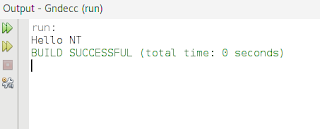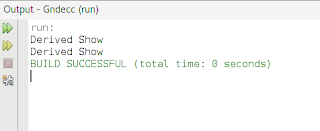Inheritance is the process of reusing the existing code .
Define new classes from the old one i.e including all features of old classes.
Following Program will illustrate the concept:
Code::
class bankaccount:
def __init__ (self):
self.bal=int(input("Enter Initial Balance:"))
def withdraw(self,amt):
if amt<self.bal:
self.bal=self.bal-amt
else:
raise ValueError ("Insufficient Funds")
def deposit(self,amt):
self.bal=self.bal+amt
def transfer(self,amt,toacc):
try:
self.withdraw(amt)
toacc.deposit(amt)
except ValueError as e:
print("Try Again",e)
def __str__(self):
return"Balance is: "+str(self.bal)
class cheque(bankaccount):
def __init__ (self):
bankaccount.__init__(self)
self.cheq={}
def process(self,amt,number,org):
try:
self.withdraw(amt)
except ValueError as e:
print("Cheque Returned for",e)
self.cheq[number]=(org,amt)
def cheqinfo(self,number):
if self.cheq.get(number):
print(self.cheq[number])
else:
print("No Such Cheque")
def withdraw(self,amt):
print('Withdrawing')
bankaccount.withdraw(self, amt)
nt=bankaccount() #object of bankaccount type created
nt.deposit(1500)
print(nt)
nt.withdraw(1500)
print(nt)
nti=bankaccount() #new object created
nt.transfer(1500, nti)
print(nt,nti)
dn=cheque()
dn.process(1500, 1001, 'nearur')
dn.cheqinfo(1001)
Define new classes from the old one i.e including all features of old classes.
Following Program will illustrate the concept:
Code::
class bankaccount:
def __init__ (self):
self.bal=int(input("Enter Initial Balance:"))
def withdraw(self,amt):
if amt<self.bal:
self.bal=self.bal-amt
else:
raise ValueError ("Insufficient Funds")
def deposit(self,amt):
self.bal=self.bal+amt
def transfer(self,amt,toacc):
try:
self.withdraw(amt)
toacc.deposit(amt)
except ValueError as e:
print("Try Again",e)
def __str__(self):
return"Balance is: "+str(self.bal)
class cheque(bankaccount):
def __init__ (self):
bankaccount.__init__(self)
self.cheq={}
def process(self,amt,number,org):
try:
self.withdraw(amt)
except ValueError as e:
print("Cheque Returned for",e)
self.cheq[number]=(org,amt)
def cheqinfo(self,number):
if self.cheq.get(number):
print(self.cheq[number])
else:
print("No Such Cheque")
def withdraw(self,amt):
print('Withdrawing')
bankaccount.withdraw(self, amt)
nt=bankaccount() #object of bankaccount type created
nt.deposit(1500)
print(nt)
nt.withdraw(1500)
print(nt)
nti=bankaccount() #new object created
nt.transfer(1500, nti)
print(nt,nti)
dn=cheque()
dn.process(1500, 1001, 'nearur')
dn.cheqinfo(1001)
Output::






